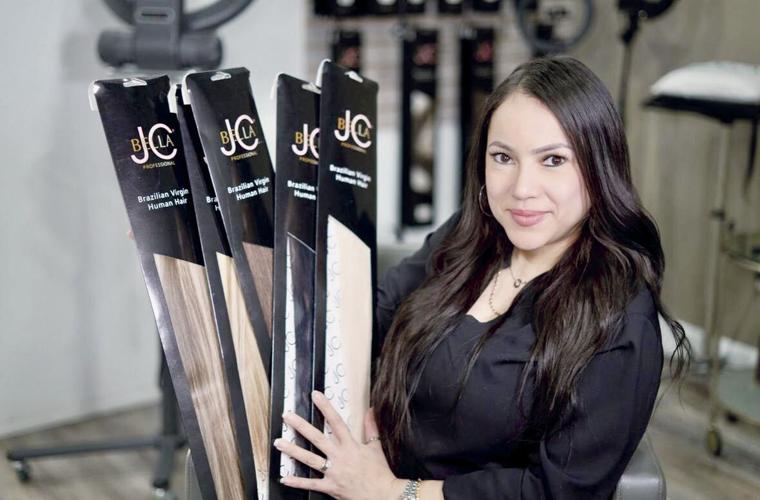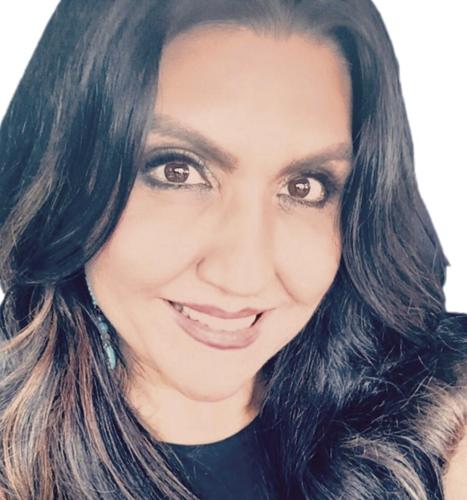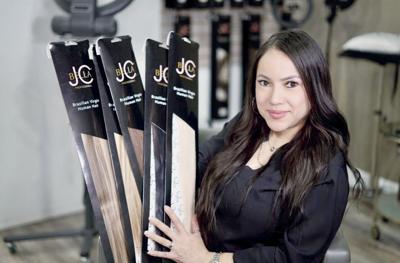
Sophia Aimen Sexton
When my family and I escaped the war in Afghanistan in 1981 we had nothing. We had left our material possessions behind to pursue safety in Pakistan, but we still felt unsafe after crossing the border.
The one thing my five sisters and I found solace in was our love of Bollywood movies. Watching entertaining films like “Qurbani” and “Dostana” wasn’t just a much-needed distraction; immersing ourselves in them felt like being wrapped in a warm, colorful hug.
I was especially mesmerized by beautiful actresses such as Zeenat Aman and Rekha with their long, shiny hair. If I could get my hair to look like theirs, I remember thinking, then maybe my life would become as perfect as theirs seemed to be.
My mom bought us some black yarn, and my sister and I braided it into our hair, pretending we had long locks that extended past our waists. Thinking about it now, it seems silly; the yarn looked nothing like real hair. But the playtime ritual helped me feel more beautiful and confident, which gave me hope.
Since then, I’ve mostly kept my hair long. It’s a personal preference, but it’s also sentimental. Taking care of my hair feels like I’m taking care of that younger version of myself – the girl who was scared and looking for any sign that she would one day live a happy life.
I have a suspicion many immigrant women feel the same way. My friend Jessica Chapman, who owns Monet Salon in Centreville, is one of them. Jessica is from Barranquilla, Colombia – also hometown to Shakira and Sofia Vergara – where thick, full hair is the standard.
Growing up, Jessica thought people who looked like those glamorous celebrities were destined for “big lives,” which is exactly what Jessica wanted for herself.
“I wanted to do something special and not stay in Colombia,” she told me. “I saw being different as equaling success.” Standing out physically was part of that.
When Jessica was 14, a classmate made a mean comment about her naturally thin hair. After school, Jessica went to a local beauty supply store and bought her first hair extensions, then went home and taught herself how to sew them in. Afterward, she looked in the mirror and felt newly empowered.
Ever since, she says, “it doesn’t matter where I am going or what I am doing. I don’t leave the house without my hair being done.”
After high school, Jessica enrolled in law school and an international business program. But in March 2010, when she was 21, she had the opportunity to come to the United States, where her cousin was living. She traveled to New York City and Miami, visited museums and dance clubs and got a job working as a waitress, while daydreaming about the life she could build here.
“When you are here, you see success is there if you are persistent,” Jessica said.
But her parents disagreed. They felt that success for Jessica was back in Colombia; after all, she was just one semester shy of completing her law degree. But Jessica no longer wanted that future for herself. “After living here, I knew I couldn’t go back,” she said. “I was ruined.”
In 2011, she took her car to an auto body shop in Alexandria. The manager, John, had blue eyes and light hair. Jessica fell fast and hard. The couple married just two months later and welcomed their son, Johnny, in 2013.
When the owner decided to sell the shop, Jessica encouraged her husband to buy it. She had long had an entrepreneurial streak.
“When I was 15 or 16, I told my mom I wanted to start a company where people paid you to grocery shop for them,” she said. “She thought it was crazy, but now look, there’s Doordash and Instacart.”
Then one day, driving past Statements cosmetology school, inspiration struck. She was reminded of her teenage years. At that time, few salons in Northern Virginia specialized in extensions. But she knew there was a need; in fact, women often came to Jessica for help with theirs.
So she enrolled in the cosmetology school and worked out a payment plan with the school’s owner, finishing the year-long program in seven months and completing 500 extra hours of training.
After passing her licensing exam in 2014, Jessica opened Monet Salon in Centreville. The first several months were challenging; she was barely breaking even. Then one morning she woke at 3 a.m. with an idea for a membership program: Clients could pay a monthly fee for maintenance of their extensions, which would provide steady income and repeat customers. Since then, the business has been a huge success.
“It makes me so happy to know my customers are walking around feeling beautiful because of what I did,” Jessica told me. “It makes me feel like I’m doing something good.”
She also has a special offering for clients who’ve lost their hair from chemotherapy.
It’s easy to think about beauty as unimportant – something that’s merely nice to have. But women must lean into the things that make them feel confident and proud. And yes, beautiful.
I found myself in Jessica’s chair when she first opened her salon, and it was clear that Jessica was a trailblazer with a vision. She’s an entrepreneur, and she’s lifting women around her up by helping them feel like the best versions of themselves.
Sophia Aimen Sexton is a professor of English at Northern Virginia Community College’s Annandale campus and co-founder of the nonprofit Female Refugee Education Empowerment.






(1) comment
This was a nice change/good write up
Welcome to the discussion.
Log In
Keep it Clean. Please avoid obscene, vulgar, lewd, racist or sexually-oriented language.
PLEASE TURN OFF YOUR CAPS LOCK.
Don't Threaten. Threats of harming another person will not be tolerated.
Be Truthful. Don't knowingly lie about anyone or anything.
Be Nice. No racism, sexism or any sort of -ism that is degrading to another person.
Be Proactive. Use the 'Report' link on each comment to let us know of abusive posts.
Share with Us. We'd love to hear eyewitness accounts, the history behind an article.